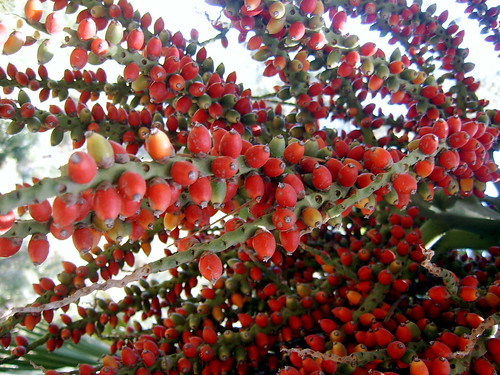Vitamin E Tocotrienols May Grow Hair in Humans
How does vitamin E affect hair loss? Currently, very little information exists on the subject.
The reason is that no official studies have really been done. There is only one study, which is related to a recently granted patent by Carotech. The product related to this patent, Toco-8 is a palm fruit extract that contains both tocopherols and tocotrienols.
These forms of vitamin E are said to be more efficient than alpha-tocopherol, which is the most common (and potentially harmful, if recent studies are to be believed) ingredient in most vitamin E supplements.
Let's take a look at the patent. Ho et al. report:
Eleven volunteers were randomized to receive the tocotrienol formulation supplementation while 8 volunteers were in the placebo group. All volunteers were randomized to receive one capsule comprising either (i) a mixture of tocotrienols and alpha-tocopheral, or (ii) a placebo, twice daily after food over a period of at least 5 months. They were seen for an efficacy evaluation every month throughout the study. The control was a placebo capsule containing 600 mg of soya bean oil, and the tocotrienol formulation consisted of capsules containing a mixture of about 50 mg of tocotrienols and about 23 i.u. alpha-tocopherol.
At the end of the supplementation period, all volunteers in the tocotrienol formulation group had positive results, recording an increase in the number of hairs in the evaluation area. Seven volunteers (64%) showed regrowth of between 10-35% while 3 volunteers (27%) had 50% or greater regrowth. One volunteer had regrowth of more than 100%. The mean percentage of increase in the number of hairs is 42.4.+-.40.9% (mean.+-.SD). The increase is statistically significant (p<0.05)>0.05) in the number of hairs was detected between baseline and post-supplementation, thus indicating that the placebo effect did not occur during this study.
However, in terms of the weight of the hair, no statistically significant difference (p>0.05) between pre- and post-supplementation was detected for both groups of volunteers (tocotrienol and placebo). The mean percentage of weight increment was 16.4.+-.42.5% in the tocotrienol formulation group while that of the placebo group had an increase of 5.7.+-.40.1%. (Table 2).
The above-mentioned studies therefore indicate that supplementation with a formulation comprising a mixture of tocotrienol, alpha-tocopherol and pharmaceutically acceptable excipient appears to promote hair growth and increase the number of hair in persons experiencing hair loss.
According to the patent, all subjects in the tocotrienol group experienced hair growth, measured by the number of hairs on the scalp. The minimum increase was 10% and the highest increase was 100%. Average increase was 42%.
What is unclear to me is whether the "50 mg of tocotrienols" mentioned in the study means 50 mg of each tocotrienol or 50 mg total. In any case, the product they formulated based on this study contains the following amounts of tocotrienols:
30 mg d-alpha-tocotrienol
4 mg d-beta-tocotrienol
52 mg d-gamma-tocotrienol
14 mg d-delta-tocotrienol
It also has 30 mg (200% RDA) of d-alpha-tocopherol, which seems kind of high. It might be, though, that the dangers of d-alpha-tocopherol are present only when the other tocopherols and tocotrienols are not present. I'll look into this later.
Since this is a new product and not many know whether it actually works, I figured this is the perfect chance for me to conduct yet another experiment in the strange world of hair growth. Instead of Toco-8, I'm going to be taking a similar product by Jarrow Formulas called Toco-Sorb, which has the following amounts:
17.3 mg d-alpha-tocotrienol
2.6 mg d-beta-tocotrienol
31.5 mg d-gamma-tocotrienol
8.6 mg d-delta-tocotrienol
Looking at these numbers, I'll need to take two servings of Toco-Sorb to get the same amount of tocotrienols as with Toco-8. There's not much price difference between the two products: 60 servings of Toco-8 costs $29.95, while 120 servings of Toco-Sorb costs $30.74.
Toco-Sorb also promises 2-3 times better bioavailability through their "specialized lipid mixture". I have no idea whether this is true or not, but I'm guessing it can't hurt.
Go to next post on this experiment
For more information on hair growth, see these posts:
Asiasari Radix Extract Grows Hair in Mice and in Human Skin Cells
3 Quick Ways to Find Out Whether Your Hair Growth Product is Working
Green Tea Extract Grows Hair in Vitro, May Work in Vivo
Mixture of 5-Aminolevulinic Acid and Iron Increases Hair Growth in Mice









4 kommenttia:
So did the Tocotrienols work? I can't find any update on the site here.
@Brian,
You can find the conclusion to the experiment here:
Hair Growth with Vitamin E Tocotrienols from Palm Oil – Experiment Conclusion
- JLL
Wow that's even better than soy! I mean did you tried this treatment JLL????? I think I'll start as fast as I can...
By the way, are you currently in a hair-loss treatment?
Congratulations for the blog keep on !
@soydude,
I did indeed -- see the link above for the conclusion of the experiment.
You can find ongoing experiments on the top right corner of the page under the "Current experiments" tab. At the moment, ongoing hair-related experiments are:
Hair Growth with Ayurveda – The Nutrich Oil Experiment
Silica for Skin, Nail & Hair Thickness
Sort of related is this:
Lutein for Skin Elasticity, Hydration and Sun Protection
Post a Comment